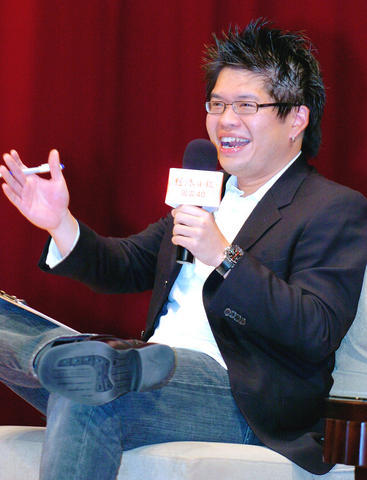In his first public speech in Taiwan, popular video-sharing site YouTube co-founder Steve Chen (
His speech attracted hundreds of local YouTube fans who were keen to pick the brain of one of the most prominent Internet hotshots.
Born in Taiwan, Chen, 29, moved to the US with his parents when he was eight years old.

PHOTO: LIAO CHEN-HUEI, TAIPEI TIMES
Wearing a white shirt and jeans, and sporting short, spiky hair and an earring in both ears, Chen ascribed YouTube's success to video being a cross-cultural communication tool "that can break the language barrier."
Chen created YouTube with his friends Chad Hurley and Jawed Karim to share video clips they had made during a gathering, he recalled.
Launched in February 2005 in Hurley's garage, YouTube has quickly accumulated high traffic volumes and became one of the world's most visited sites.
It was acquired by Internet titan Google Inc last October for US$1.65 billion.
With half of its users living outside the US, YouTube may develop different language versions for the site, including a Mandarin version for Taiwan, to boost its appeal to global users, he said.
Chen delivered the speech at a forum in Taipei which was also attended by other industry leaders, including Chunghwa Telecom Co (
Chen said the Internet was moving from the so-called Web 2.0 era -- user-generated content in a user-oriented environment -- to the Web. 3.0 era, in which users are no longer tied to their PCs, while enjoying much more personalized and individualized content and services on the go.
Going mobile
To follow the trend, YouTube will go mobile by the end of next year, allowing users to share video clips on handsets and mobile devices, he said.
The coming of the Web 3.0 era means more bandwidth, faster transmission speeds, and more content with more diversification to serve increasingly complicated user needs, Hochen said.
To achieve these goals, significant investment in infrastructure is needed, he said. While the nation's largest telecom company tries to build more base stations, it has met constant protests from local residents, he said.
Another obstacle is concerns over the relevant business models, Hochen said. Web 2.0 sites generate income mainly from advertising and subscription, which does not seem to ensure a return on investments in the short term, he said.
Kuei shrugged off the concern, saying that huge advertising revenues were ready to pour into Web 2.0 sites, as they could better target specific customer groups from different budget segments.
The total advertising budget in Taiwan last year was between NT$40 billion (US$1.21 billion) and NT$50 billion, which is more than many public companies' annual revenues, Kuei said.
One challenge the speakers seemed to agree on is piracy. In China, for example, there are already more than 200 video-sharing sites copying YouTube's business model.
But as long as YouTube can remain a destination offering the most content catering to a majority of users, users will stay with the site, Chen said.

Three experts in the high technology industry have said that US President Donald Trump’s pledge to impose higher tariffs on Taiwanese semiconductors is part of an effort to force Taiwan Semiconductor Manufacturing Co (TSMC, 台積電) to the negotiating table. In a speech to Republicans on Jan. 27, Trump said he intends to impose tariffs on Taiwan to bring chip production to the US. “The incentive is going to be they’re not going to want to pay a 25, 50 or even a 100 percent tax,” he said. Darson Chiu (邱達生), an economics professor at Taichung-based Tunghai University and director-general of

Hon Hai Precision Industry Co (鴻海精密) is reportedly making another pass at Nissan Motor Co, as the Japanese automaker's tie-up with Honda Motor Co falls apart. Nissan shares rose as much as 6 percent after Taiwan’s Central News Agency reported that Hon Hai chairman Young Liu (劉揚偉) instructed former Nissan executive Jun Seki to connect with French carmaker Renault SA, which holds about 36 percent of Nissan’s stock. Hon Hai, the Taiwanese iPhone-maker also known as Foxconn Technology Group (富士康科技集團), was exploring an investment or buyout of Nissan last year, but backed off in December after the Japanese carmaker penned a deal

WASHINGTON POLICY: Tariffs of 10 percent or more and other new costs are tipped to hit shipments of small parcels, cutting export growth by 1.3 percentage points The decision by US President Donald Trump to ban Chinese companies from using a US tariff loophole would hit tens of billions of dollars of trade and reduce China’s economic growth this year, according to new estimates by economists at Nomura Holdings Inc. According to Nomura’s estimates, last year companies such as Shein (希音) and PDD Holdings Inc’s (拼多多控股) Temu shipped US$46 billion of small parcels to the US to take advantage of the rule that allows items with a declared value under US$800 to enter the US tariff-free. Tariffs of 10 percent or more and other new costs would slash such

SENSOR BUSINESS: The Taiwanese company said that a public tender offer would begin on May 7 through its wholly owned subsidiary Yageo Electronics Japan Yageo Corp (國巨), one of the world’s top three suppliers of passive components, yesterday said it is to launch a tender offer to fully acquire Japan’s Shibaura Electronics Co for up to ¥65.57 billion (US$429.37 million), with an aim to expand its sensor business. The tender offer would be a crucial step for the company to expand its sensor business, Yageo said. Shibaura Electronics is the world’s largest supplier of thermistors, with a market share of 13 percent, research conducted in 2022 by the Japanese firm showed. If a deal goes ahead, it would be the second acquisition of a sensor business since